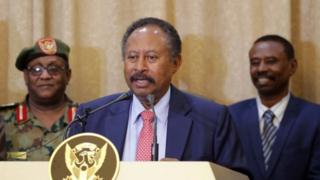Sudan appoints PM in move towards civilian rule
Sudan has appointed a new prime minister as the country embarks on a three-year transition to civilian rule.
Prime Minister Abdalla Hamdok said achieving peace and solving the economic crisis were priorities.
His appointment comes as Lt-Gen Abdel Fattah Abdelrahman Burhan was sworn in as leader of the new Sovereign Council.
The new government will run the country until an election. There have been months of turbulence including the deaths of dozens of protesters.
The opposition hopes the new appointments will usher in an end to military rule.
The crisis began with protests at the end of last year which led to the ousting of Omar al-Bashir after 30 years of authoritarian government.
Mr Hamdok was sworn in as transitional prime minister on arrival from Ethiopia, where he has worked as a respected senior economist for the UN since 2011 before stepping down last year.
“The government’s top priorities are to stop the war, build sustainable peace, address the severe economic crisis and build a balanced foreign policy,” he told reporters.
Last year, Mr Hamdok was nominated by Mr Bashir to the job of finance minister, but he turned it down, the AFP news agency reported.
The swearing in of Mr Hamdok and the Sovereign Council marks the first time that Sudan has not been under full military rule since Mr Bashir came to power in a 1989 coup.
The new Sovereign Council replaces the Transitional Military Council (TMC) that took charge after the Islamist ruler was toppled after mass protests.
Gen Burhan will lead a group of six civilians and four other military officers as part of a planned 39-month long transition to democracy.
Who is Abdalla Hamdok?
How did we get here?
On 4 August the military and protesters signed a constitutional declaration which paved the way for the formation of a transitional government. A formal signing ceremony took place on 17 August.
They agreed on the following:
The long transition period is seen as a victory for the pro-democracy movement – the generals had threatened a snap election after the 3 June crackdown, during which more than 120 people were reportedly killed, with many of the dead dumped in the River Nile.
Demonstrators argued that Mr Bashir’s regime was so deeply entrenched that it would take time to dismantle its political network and open the way for free and fair elections.
How did the crisis unfold?
It can be traced back to December 2018, when then President Bashir’s government imposed emergency austerity measures.
Cuts to bread and fuel subsidies sparked demonstrations in the east over living standards, and the anger spread to the capital.
The protests broadened into demands for the removal of Mr Bashir, who had been in charge for 30 years.
In April, the president was overthrown by the military after sit-ins outside the defence ministry, but demonstrators then wanted to ensure authority was swiftly transferred to a civilian administration.
A council of generals led by Gen Burhan assumed power, but it has struggled to return the country to normality.
The army is not a unified force in Sudan; paramilitary organisations and various Islamist militias hold some sway.
The Rapid Support Forces (RSF) led by Hemeti – which grew out of the notorious Janjaweed militia that was accused of carrying out a genocide in the Darfur region of western Sudan – have been blamed for recent abuses.
These include the 3 June massacre.
RSF leaders have denied planning the killings, which they say were carried out by rogue elements.
Source: Read Full Article




